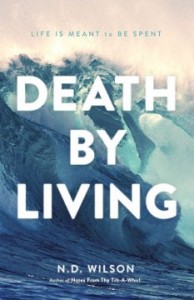My church used to go camping. When I was little, probably just 8 years old, our entire church would drive out to the country, to a beautiful stretch of land owned by a sister church, and we would camp out.
For a kid who grew up in the inner city, camping was quite the experience. There are several things that I can still remember vividly: the height of the trees, the morning fog, the smell of the ashes and embers left smoking from the previous night’s fire. And the stars. So many stars.
I knew that our solar system was in a galaxy called the Milky Way, but I didn’t know that you could actually see the Milky Way from our planet. My view was always obstructed by the city lights. The sky of my childhood was mostly red, except for when we went camping. There, away from the buzzing street lamps and urban light pollution, I could finally see the night sky that my ancestors saw. I was filled with wonder.
How far away were these stars? Did they have planets, too? Were they bigger and brighter than our sun? My imagination was kindled by the heavenly lights, which, even though they don’t appear to move, put on a far better show than anything I could watch on television.
C.S. Lewis had this same sort of experience with the countryside of his native Ireland. He referred to the feelings that nature stirred up within him as Joy. It was as though something was calling to him from beyond the created order; a voice, perhaps, or a distant memory of someplace that he had never been but for which his heart deeply longed.
I have come to believe that I am haunted by the memory of something that I have never experienced, but know beyond reason to be true. We are all haunted by the memory of a place where everything was good, true, and beautiful; a place untainted by the tragedy and suffering wrought everywhere by evil. There was a time before the world bent in on itself, unleashing this torrent of death. That place is Eden, and that time is the beginning. Like a specter haunting its earthly home, Eden wanders the hallways of our imaginations.
Our hearts know that things are not as they ought to be. Something has gone horribly wrong, and as a result Eden’s gates have been shut and locked from the inside. We have been expelled, and there can be no going back, at least not by the old way. We have lost Eden, and our hearts won’t let us forget it. This memory has been burned into the human imagination.
•••••
I sit on the beach, holding my son as he is slowly dying of a rare and fatal neurological disorder, and I’m longing for a place that we lost. I’m regretting the sin we committed that let things like Batten Disease enter the gene pool. When we lost Eden, we gained death—death in all its forms and by all its means. Even the slow, crippling death of a child.
I want to run, to run back to Eden and throw open its gates. I want to carry my son to the Tree of Life, to lay him down under its shade and cover him in its leaves. I want to run with him through fields of grass untainted by the foolishness of humanity and build him a home in a land without idols. I want to go back to the place where we talked with God face to face, so that the Great [Re]Creator might breathe on him and HE WOULD LIVE!
But I can’t. There is no going back. The gates of Eden are shuttered forever. The Tree is gone. Eden is lost.
•••••
Every wistful desire, every indescribable longing—what C.S. Lewis called “Joy”—is misdirection. Our hearts ache for what we have lost and cannot regain. This is why all natural beauty is tinged with sorrow. A sunrise over the ocean fills us with awe but leaves us strangely empty. So, too, with a storm over the mountains, or the mist upon the rolling green hills on an early Irish morning. The earth reminds us of Eden, so we retreat to cities, congregating amidst the unnaturally straight lines of the structures we build, structures designed not to protect our stuff or our lives, but to protect our hearts from the pain of the memory of Eden’s loss.
We have to go back and we cannot go back. We must press on. The only way to go is forward, to hope that somehow, we will stumble our way into Eden again, or perhaps into something fuller and better. Perhaps, even, someone will come to us to show the way. Would that God may light the way again, to throw open the gate, to sound the trumpet, proclaiming Eden open once more. Would that he might come to us, to speak to us, to invite us, to know us, to suffer with us, and perhaps, dare I say it, to die with us. To participate in this Unmaking which we have made. To capture it. To engulf it. To swallow it up forever.
Yes, this must be the way. Not that we might find Eden again by luck or adventure or triumph, but that the One who inhabits the Original Eden, the Greater Eden, might come to us and speak to us in our exile. That he might bear our diseases and take up our infirmities. That he might even carry the burden of our sins, and in doing so, woo us out of our idolatry.
Eden, after all, is only Eden because of the One who abides there, who met us there, who spoke with us face to face and walked with us in the cool of the day. The sting of losing Eden is not that we have lost the beauty of trees and mountains and rivers–those we still have aplenty–but that we have lost the beauty of knowing God. The power of the Tree of Life is not found in the fruit or the leaves, but in the arms of the One who prunes it.
•••••
Oh, my heart, be wooed! Be wooed from your idolatry and lusts and deception and turn your face toward the One who is worthy, who is good, who is power wrapped in humility.
Oh, my heart, be wooed! Be wooed by the One who can heal with a touch and raise the dead with a word. Oh, foolish heart, turn yourself to the One who turned to you, who looked for you in the darkness of this land of exile, who suffered for you and all your foolish and idolatrous brothers and sisters. Turn your face to the One who died, and in dying forgave all your sins; who rose again, and in rising swallowed up death forever.
Oh, my heart, be wooed! Be wooed by the Bridegroom who pursues you with the ferocity of the purest agape. Be wooed, oh my heart, be wooed, because what you have lost in Eden you have gained a hundredfold in Jesus.
•••••
It’s easy for me to lose sight of this, to think about what I’ve lost in Eden, what I could lose with Zeke, rather than focus on what I’ve gained in Jesus. Eden haunts me, but Jesus is with me. No, it doesn’t always feel that way, but there is a reality, a truth, that exists independently of what I feel or perceive, and at the center of that reality, defining it, incarnating it, animating it, is Jesus.
Jesus offers you and me and all the rest of us far more than Eden ever could. Eden was a place from which God came and went; Jesus is a person, a man, who is God. He was God, is God, and will always be God. We know God through him, in him, and because of him. We see what God looks like, acts like, talks like, and loves like in Jesus. Everything about Jesus is God. There is nothing about Jesus that is not God.
But sometimes my foolish and shallow heart is drawn to pretty things that shine and glow. My desires turn toward idols, toward that which promises what it cannot deliver. I try to find Joy in created things rather than in the Creator, the Sustainer, the Redeemer. The Joy is not in the mountains; the Joy is in the One who treads the mountains. The Joy is not in the ocean; the Joy is in the One who filled the Ocean and sees its depths.
All that we have lost in Eden, and more, is found in Jesus. But he isn’t flashy. He isn’t urgent. He doesn’t shine or glow. He is patient. He is strong. He is brave. He is power wrapped in humility. He is agape love clothed in tenderness and strength and empathy and holiness. He loves and he loves and he loves and he haunts your heart, wooing you, calling to you. “Return to me! I can give you Eden and so much more! I can give you myself, perfect goodness and purest light and strongest love.” In losing Eden, do not lose yourself. Find yourself in the One who passed through death to find you.
 The story is the story of Wilson’s life. Or, more accurately, the lives that led to his life and how those lives continue to impact his life. It’s a family memoir and reflection on the mortality of human existence. It’s the story of people you’ve never heard of, but who have lived fully enough to deserve their own biopic on PBS. It’s the story of how stories get passed from generation to generation to generation, and how those stories guide the paths of grandchildren and great-grandchildren.
The story is the story of Wilson’s life. Or, more accurately, the lives that led to his life and how those lives continue to impact his life. It’s a family memoir and reflection on the mortality of human existence. It’s the story of people you’ve never heard of, but who have lived fully enough to deserve their own biopic on PBS. It’s the story of how stories get passed from generation to generation to generation, and how those stories guide the paths of grandchildren and great-grandchildren.
